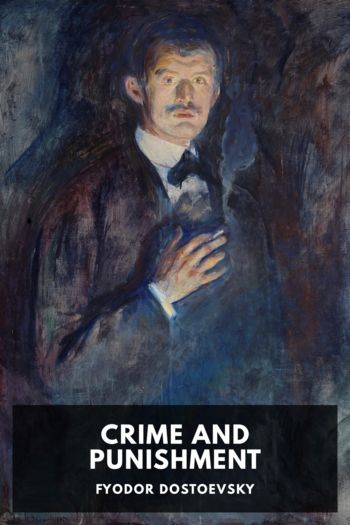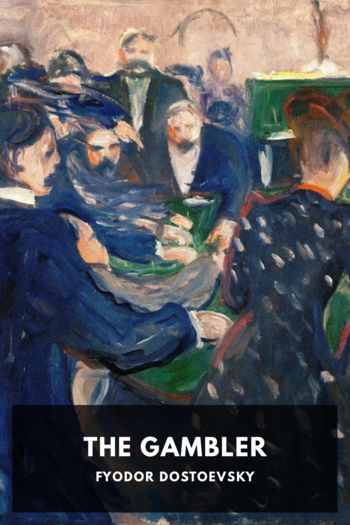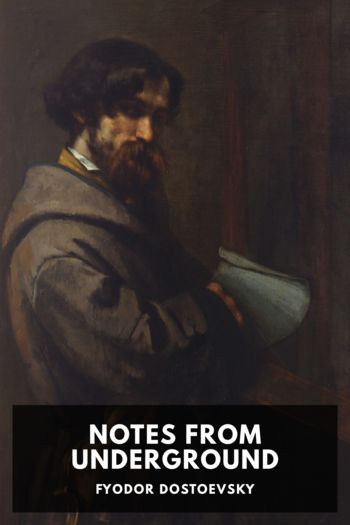Crime and Punishment by Fyodor Dostoevsky (love novels in english TXT) 📕

- Author: Fyodor Dostoevsky
Book online «Crime and Punishment by Fyodor Dostoevsky (love novels in english TXT) 📕». Author Fyodor Dostoevsky
When he had said this, he suddenly held out his hand to his sister, smiling without a word. But in this smile there was a flash of real unfeigned feeling. Dounia caught it at once, and warmly pressed his hand, overjoyed and thankful. It was the first time he had addressed her since their dispute the previous day. The mother’s face lighted up with ecstatic happiness at the sight of this conclusive unspoken reconciliation. “Yes, that is what I love him for,” Razumihin, exaggerating it all, muttered to himself, with a vigorous turn in his chair. “He has these movements.”
“And how well he does it all,” the mother was thinking to herself. “What generous impulses he has, and how simply, how delicately he put an end to all the misunderstanding with his sister—simply by holding out his hand at the right minute and looking at her like that. … And what fine eyes he has, and how fine his whole face is! … He is even better looking than Dounia. … But, good heavens, what a suit—how terribly he’s dressed! … Vasya, the messenger boy in Afanasy Ivanitch’s shop, is better dressed! I could rush at him and hug him … weep over him—but I am afraid. … Oh, dear, he’s so strange! He’s talking kindly, but I’m afraid! Why, what am I afraid of? …”
“Oh, Rodya, you wouldn’t believe,” she began suddenly, in haste to answer his words to her, “how unhappy Dounia and I were yesterday! Now that it’s all over and done with and we are quite happy again—I can tell you. Fancy, we ran here almost straight from the train to embrace you and that woman—ah, here she is! Good morning, Nastasya! … She told us at once that you were lying in a high fever and had just run away from the doctor in delirium, and they were looking for you in the streets. You can’t imagine how we felt! I couldn’t help thinking of the tragic end of Lieutenant Potanchikov, a friend of your father’s—you can’t remember him, Rodya—who ran out in the same way in a high fever and fell into the well in the courtyard and they couldn’t pull him out till next day. Of course, we exaggerated things. We were on the point of rushing to find Pyotr Petrovitch to ask him to help. … Because we were alone, utterly alone,” she said plaintively and stopped short, suddenly, recollecting it was still somewhat dangerous to speak of Pyotr Petrovitch, although “we are quite happy again.”
“Yes, yes. … Of course it’s very annoying. …” Raskolnikov muttered in reply, but with such a preoccupied and inattentive air that Dounia gazed at him in perplexity.
“What else was it I wanted to say?” He went on trying to recollect. “Oh, yes; mother, and you too, Dounia, please don’t think that I didn’t mean to come and see you today and was waiting for you to come first.”
“What are you saying, Rodya?” cried Pulcheria Alexandrovna. She, too, was surprised.
“Is he answering us as a duty?” Dounia wondered. “Is he being reconciled and asking forgiveness as though he were performing a rite or repeating a lesson?”
“I’ve only just waked up, and wanted to go to you, but was delayed owing to my clothes; I forgot yesterday to ask her … Nastasya … to wash out the blood … I’ve only just dressed.”
“Blood! What blood?” Pulcheria Alexandrovna asked in alarm.
“Oh, nothing—don’t be uneasy. It was when I was wandering about yesterday, rather delirious, I chanced upon a man who had been run over … a clerk …”
“Delirious? But you remember everything!” Razumihin interrupted.
“That’s true,” Raskolnikov answered with special carefulness. “I remember everything even to the slightest detail, and yet—why I did that and went there and said that, I can’t clearly explain now.”
“A familiar phenomenon,” interposed Zossimov, “actions are sometimes performed in a masterly and most cunning way, while the direction of the actions is deranged and dependent on various morbid impressions—it’s like a dream.”
“Perhaps it’s a good thing really that he should think me almost a madman,” thought Raskolnikov.
“Why, people in perfect health act in the same way too,” observed Dounia, looking uneasily at Zossimov.
“There is some truth in your observation,” the latter replied. “In that sense we are certainly all not infrequently like madmen, but with the slight difference that the deranged are somewhat madder, for we must draw a line. A normal man, it is true, hardly exists. Among dozens—perhaps hundreds of thousands—hardly one is to be met with.”
At the word “madman,” carelessly dropped by Zossimov in his chatter on his favourite subject, everyone frowned.
Raskolnikov sat seeming not to pay attention, plunged in thought with a strange smile on his pale lips. He was still meditating on something.
“Well, what about the man who was run over? I interrupted you!” Razumihin cried hastily.
“What?” Raskolnikov seemed to wake up. “Oh … I got spattered with blood helping to carry him to his lodging. By the way, mamma, I did an unpardonable thing yesterday. I was literally out of my mind. I gave away all the money you sent me … to his wife for the funeral. She’s a widow now, in consumption, a poor creature … three little children, starving … nothing in the house … there’s a daughter, too … perhaps you’d have given it yourself if you’d seen them. But I had no right to do it I admit, especially as I knew how you needed the money yourself. To help others one must have the right to do it, or else Crevez, chiens, si vous n’êtes pas contents.” He laughed, “That’s right, isn’t it, Dounia?”
“No, it’s not,” answered Dounia firmly.
“Bah! you, too, have ideals,” he muttered, looking at her almost with hatred, and smiling sarcastically. “I ought to have considered that. … Well, that’s praiseworthy, and it’s better for you … and if you reach a line you won’t overstep, you will be unhappy … and if you overstep it, maybe you will be still unhappier. … But all that’s nonsense,” he added irritably, vexed at being carried away. “I only meant to say that I beg





Comments (0)